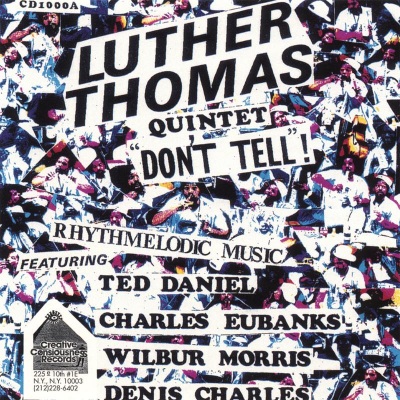
Luther Thomas Quintet 'don't Tell' Rhythmelodic Music
by Derek Taylor April 2001 Luther Thomas is a living answer to the Monk coined phrase 'ugly beauty'. His signature tone on alto is anything but comely, but there's an underlying candor and confidence to his sound that is strangely beguiling. A founding member of the AACM styled BAG (Black Artist's Group) out of St. Louis, Thomas cut his improvisatory teeth early with other consonant-minded colleagues. Some of his earliest experiments involved the alchemical melding of funk and free jazz into an exciting, if unruly amalgam. The mutinous spirit that fueled such proleptical investigations leaves telltale footprints all over his first date for CIMP. Incorporating a variety of specially-devised compositional and conducting techniques referred to variously in the liners as Semi-conduction and Rhythmelodics, Thomas sets up a variety of ensemble combinations based essentially on pairings of instruments. On "Swimming Lake Oliver" the horns work as lead voices with bass and drums supplying a steady rhythmic drive. The compositional crux on the phonetically centered "BoBopBoLuBo" is Rollins' "St. Thomas" theme unzipped, overblown and recombinated over the Calypsonian traps work of Denis Charles. With the titular "Tag (You're It)" the players play a quick game of chasing melodic tails as Thomas reaches for Aylerian altissimo heights and Ted Daniel sounds strangely like Dizzy Gillespie circa "Salt Peanuts". In each instance the results are playfully erratic, but come off sounding somewhat overwrought. Thomas is more overtly linear on "Don't Tell", dappling a thematic line with dots of tone color. Daniel's entry on the piece is more subdued as he hunts and pecks at the same theme, fingering his valves and devising some crafty slurs. Wilber Morris and Charles march along on a thumping beat before opening solo space for themselves that closes the track. Daniels sits out on "As If It Were Love" and Charles takes to the sidelines too for the duet piece "Straight No Tonic". In both instances Thomas seems less structurally self-conscious and the bravura inherent in his off-kilter, vibrato-stained tone is given greater purchase. The underlying influence of Ornette Coleman rises up in stark relief on the blues-flavored "Kool Aid", where Daniel's smears clip the edges of Thomas' piercing banshee wails. The mellow, almost meditational "Spirits' Roost la Rush" is an unexpected turn with Daniel shifting to Kahai horn, Thomas blowing at his most soulful and Morris bowing beautifully. "For Don C.", a quick homage to Don Cherry (an obvious influence on each of the players) that returns to the mood to rollicking whimsy, winds up the set. A disc with some warts and blemishes to be sure, this date is still an exciting ride and offers an accurate portrait of Thomas as a composer and improviser.
